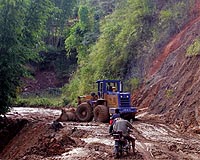| . |  |
. |
Belfast, UK (SPX) Aug 11, 2009 More accurate global weather forecasts and a better understanding of climate change are in prospect thanks to a breakthrough by engineers at Queen's University Belfast's Institute of Electronics, Communications and Information Technology (ECIT). The ECIT team has developed a high performance electronic device - known as a dual polarized Frequency Selective Surface filter - that is to be used in future European Space Agency (ESA) missions. The filters will be installed in instruments being developed by ESA for meteorological satellites it plans to launch between 2018 and 2020. The ESA instruments are used to detect thermal emissions in the Earth's atmosphere. The data measures temperature, humidity profiles, and gas composition, which are in turn entered into operational systems and used to forecast weather and pollution. Lead ECIT engineer Raymond Dickie said: "Measuring just 30mm in diameter and 1/100mm thick, the devices will help to provide a much more comprehensive analysis of conditions in the Earth's atmosphere than has been possible previously. "Up to now, spaceborne remote sensing instruments have only been capable of separating either the vertically or horizontally polarized components of naturally occurring thermal emissions from gases in the Earth's atmosphere - but not both together at the same time. The invention of the new filter resolves this problem and will enable complex imaging of clouds to be undertaken for the first time at very short wavelengths." Global patent applications have already been filed for the filters which are constructed by ECIT engineers and research staff at Queen's University's Northern Ireland Semiconductor Research Centre in Belfast. The filters have been developed as a result of a Pounds 1.2 million investment in Queen's by EPSRC, EADS Astrium and ESA to develop the technology, and have taken over 10 years to develop. Robert Cahill, a member of the project team added: "As a result of the new filter, scientists will gain access to completely new data on a range of phenomenon including ozone depletion and the size of water particles in cirrus clouds. This in turn will enable more accurate global weather forecasts to be compiled and will provide important new insights into climate change." Share This Article With Planet Earth
Related Links Queen's University Belfast ECIT Weather News at TerraDaily.com
 Landslide kills 24 in northern Myanmar: police
Landslide kills 24 in northern Myanmar: policeYangon (AFP) July 9, 2009 A landslide caused by heavy rain killed 24 migrant mineworkers in northern Myanmar, police confirmed Thursday. The accident at Lonkhin near Phakant -- in the country's northernmost state of Kachin -- happened during a period of severe wet weather from July 4-6, an official from the state's police force said. "Altogether 24 people were killed -- 11 men and 13 women -- during the landslide ... read more |
|
| The content herein, unless otherwise known to be public domain, are Copyright 1995-2009 - SpaceDaily. AFP and UPI Wire Stories are copyright Agence France-Presse and United Press International. ESA Portal Reports are copyright European Space Agency. All NASA sourced material is public domain. Additional copyrights may apply in whole or part to other bona fide parties. Advertising does not imply endorsement,agreement or approval of any opinions, statements or information provided by SpaceDaily on any Web page published or hosted by SpaceDaily. Privacy Statement |